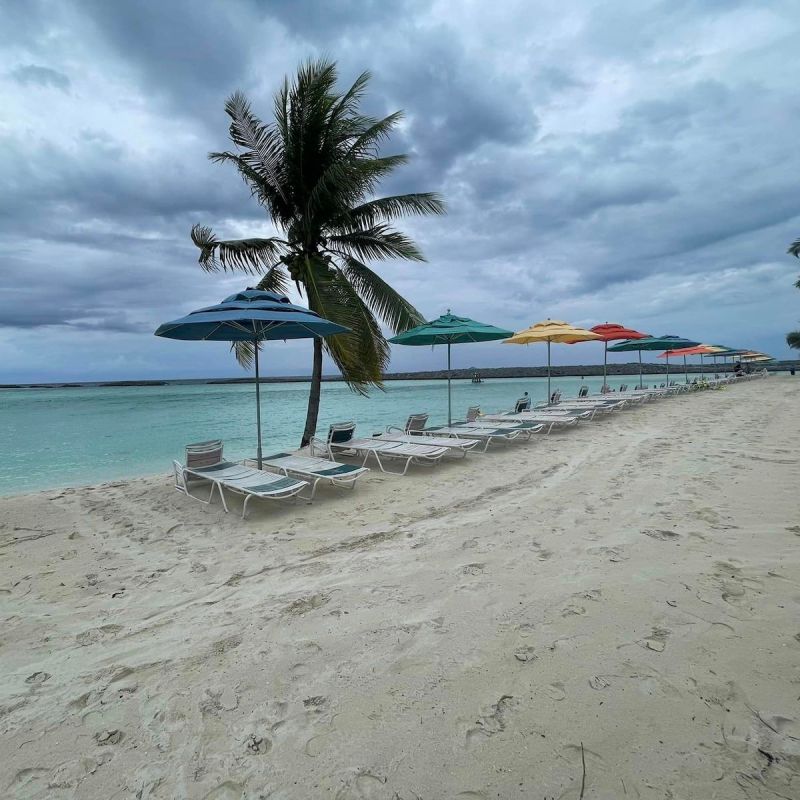
If attractively priced fall Caribbean cruises have piqued your interest, make sure you’re going into your vacation planning process fully informed with your eyes wide open. Fall is hurricane season in the Caribbean and South Florida, where many Caribbean cruises depart from. Those super deals on cruise fare just might come with a catch.
Videos by TravelAwaits
Hurricane season is officially from June 1 through November 30, with hurricanes tending to be more active in September and October. Hurricane season comes on the heels of the summer travel season, and you’ll almost always find lower cruise prices from September through November. The kids are back in school and cruise lines are pulling out the stops to entice vacationers.
Our family recently returned from a September cruise that was about 40 percent cheaper than the identical cruise in June. We snagged the lower price and pulled our kids out of school. Then Hurricane Ian happened. Here are eight things I wish I knew before booking a cruise during hurricane season.
1. Travel Insurance/Trip Protection Is Important
Whether you purchase a cruise protection plan through your cruise, a single-trip policy, or blanket travel insurance that covers any trip you take for a specified period, make sure you’ve got something in case plans go awry due to weather or any other reason.
Whatever type of coverage you obtain, make sure you’re clear on your coverage. Specifically, make sure you understand what, when, and how a hurricane or tropical storm coverage kicks in. In other words, get the insurance and read the fine print.
As a travel journalist, I carry an annual policy that covers most things that can go wrong. If you’re not a frequent traveler, I recommend budgeting for coverage as you’d budget for any other travel-related expense. Talk to your travel planner or insurance representative for more specific advice but in the case of hurricanes and tropical storms, the general rule of thumb is to make sure you purchase coverage before the storm is named.
2. Your Cruise Is Probably Not Going To Be Canceled
Canceled cruises are rare. A cruise line is more likely to adjust the itinerary to travel around the storm or delay departure than it is to outright cancel. It can be unnerving to know you’ve got a vacation booked and watch a hurricane’s path unfold. If you’re an anxious traveler or don’t do well with uncertainty, waiting to see what a storm is going to do is stressful.
Many cruisers today join Facebook groups specific to their cruise that allow them to connect with other passengers and ask cruise-related questions. If a tropical storm is looming, you can be sure group chatter will turn to weather-related topics. In the group for my September 2022 cruise, there was lots of panicked discussion as Gaston, Hermine, and Ian took shape.
The most-asked questions centered on whether the cruise line would cancel. Several group members reported proactively canceling their plans. While it’s not for me to call someone else’s reaction to severe weather unnecessary or knee-jerk, make sure you understand the financial consequences of canceling your cruise based on future or unknown weather conditions.
If your cruise is canceled, it likely won’t be canceled until the last minute. The cruise line will use email, text, or in-app notifications to spread the message of cancellations, so make sure you’re signed up to receive alerts. Resist the temptation to call the cruise line. The people manning the call center aren’t going to have info on weather-related cancellations.

3. Don’t Get Super Attached To Your Itinerary
People choose cruises for a variety of reasons, but one of the most common is choosing a cruise based on where the ship is going. Sailing around a storm might mean missing ports or stopping at ports in a different order than what was originally routed.
Our recent September cruise had three stops in the Bahamas. We booked port activities and packed our snorkel gear with our sights on lazy beach days and using our GoPro to capture underwater shenanigans. One stop was skipped entirely. We got an extra sea day to avoid the storm. One stop was almost as planned but ended early because of a torrential downpour. The stop that went as planned (Nassau) was the day we’d booked activities on the ship.
We still had a great time. There was some disappointment over the snorkel adventure that wasn’t. As I planned this cruise I was most excited about the 2 days where plans went a little south due to weather. I struggled a little bit to stay positive. At the end of the day, I kept my mind on the fact that I was on a beautiful ship with my family and that someone else was doing the cooking and cleaning up.
4. Know The Cancellation Policy For Shore Excursions
If you book your shore excursions through the cruise line, cancellations due to missed port stops will be automatic. In most cases, guest services will help you rebook. If you’ve booked a shore excursion outside the cruise line, you may need to do a little more leg work.
Make sure you know what happens to your money if your ship skips a port or your port day changes. Most independent tour companies require guests to pay in full upon booking. Make sure you’re aware of the refund policy.
5. Know Your Tender Ports
Sometimes your cruise ship will dock directly at a port. Other times, the ship will anchor offshore, and you’ll take a smaller boat (tender) ashore. Whether a ship will dock or utilize a tender can depend on several things: the size of the ship, the size of the port, how many other ships are in port, or the depth of the water.
If seas are rough, using a tender to get ashore may not be safe. If tendering is the only option for guests to go ashore, this might factor into the decision to skip a stop in the event of bad weather. If your litmus test for cruise success hinges on a particular port, knowing if it’s a tender port may help manage expectations… or prepare for a little extra motion sickness.
6. Pack Extra Seasick Remedies
While most ship’s infirmaries supply seasick remedies, I always recommend packing your own. If it’s your first cruise and you’re not sure if you’ll get seasick, I suggest packing a couple of different options. If you’re cruising during storm season, you’re more likely to encounter rough seas so make sure you pack a bit extra.
I do not typically get seasick, but I experienced a slight queasiness during our most recent cruise. Our captain and crew did a fantastic job at steering around Hurricane Ian, but I definitely felt the ship’s motion more than normal. It didn’t get bad enough to where I needed to take medicine, but I was glad to have extra.
My husband is the motion sickness guy in our family. He uses a Relief Band, which is a wristband that sends an electric current to his median nerve to prevent nausea. He also doubles up when the seas are really rough and use transdermal patches. These are what I use for my kids if they start experiencing symptoms of motion sickness.
7. Your Cruise Might Not Be Impacted, But Your Trip Home Might Be
If a storm has hit land or if your port is under a storm watch/warning, your flight home might be delayed or canceled. While there’s not a lot you can do about this, being aware that it’s a possibility can help you formulate Plan B, if necessary.
Don’t travel broke. If you have to stay in a hotel because of a canceled flight, make sure you’ve got the resources to be able to do so. Expect to pay more or to have to go further from the port/airport to find lodging. If this happens to you, it will be happening to others as well.
Know your airline’s change policy. Our return flight was headed in the same direction as the storm. Ian had hit land while we were out to sea and was traveling north, so we found another flight that avoided the direction of the storm. Our airline waived change fees for Ian-related travel, and we got a flight that worked better for us.
8. Trust The Cruise Line
Accepting unknowns and things you can’t control is a big part of cruise travel during hurricane season. The cruise line and the crew know it’s hurricane season and place a high priority on protecting passengers, their resources, and their people. They’re not going to steer you into a storm and place you at risk so you can be scared and have a rotten vacation.
If you’re going to cruise during hurricane season, you must be able to trust these things and resign yourself to going with the (literal) flow and not knowing every step of how the sausage gets made. Start watching the weather forecast a week out and be informed but agree with yourself and your travel party to believe the cruise line has everyone’s best interest at heart.
Would I Do It Again?
Now that I’ve gone on a cruise during a hurricane, would I book another cruise during hurricane season?
I’m a “never say never” traveler and am a sucker for a good deal. That said, I told my husband I didn’t want to book another cruise during hurricane season. We moved a cruise we’d booked for September 2023 to later in the year, which increased the price of our cruise substantially.
I’m a seasoned enough traveler to know that flexibility is important, and we were able to pivot and still have a great trip. I don’t regret going on this cruise and the time with my family, but if we do book during hurricane season again, I’ll approach it differently. I’d make sure to be more invested in enjoying the ship and less invested in being at a particular port on a particular day. If you can adopt that philosophy and live with a little last-minute uncertainty in your travel plans, then go grab those sweet fall cruise deals.
